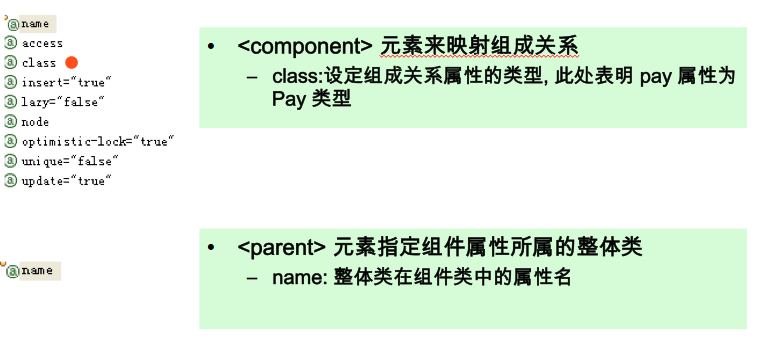建立域模型和关系数据模型有着不同的出发点:
- 域模型: 由程序代码组成, 通过细化持久化类的的粒度可提高代码的可重用性, 简化编程
- 在没有数据冗余的情况下, 应该尽可能降低表的数目, 简化表之间的參照关系, 以便提高数据的訪问速度
- 值(value)类型: 没有 OID, 不能被单独持久化, 生命周期依赖于所属的持久化类的对象的生命周期
- 实体(entity)类型: 有 OID, 能够被单独持久化, 有独立的生命周期(假设实体类型包括值类型,这个值类型就是一个组件,尽管是由两个类,不同在数据库中用同一张数据库表表示)


package com.atguigu.hibernate.entities;
public class Worker {
private Integer id;
private String name;
private Pay pay;
public Integer getId() {
return id;
}
public void setId(Integer id) {
this.id = id;
}
public String getName() {
return name;
}
public void setName(String name) {
this.name = name;
}
public Pay getPay() {
return pay;
}
public void setPay(Pay pay) {
this.pay = pay;
}
}
<?xml version="1.0"?> <!DOCTYPE hibernate-mapping PUBLIC "-//Hibernate/Hibernate Mapping DTD 3.0//EN" "http://hibernate.sourceforge.net/hibernate-mapping-3.0.dtd"> <!-- Generated 2014-1-2 16:14:33 by Hibernate Tools 3.4.0.CR1 --> <hibernate-mapping package="com.atguigu.hibernate.entities"> <class name="Worker" table="WORKER"> <id name="id" type="java.lang.Integer"> <column name="ID" /> <generator class="native" /> </id> <property name="name" type="java.lang.String"> <column name="NAME" /> </property> <!-- 映射组成关系 --> <component name="pay" class="Pay"> <!-- 指定组成关系的组件的属性 --> <property name="monthlyPay" column="MONTHLY_PAY"></property> <property name="yearPay" column="YEAR_PAY"></property> <property name="vocationWithPay" column="VOCATION_WITH_PAY"></property> </component> </class> </hibernate-mapping>
package com.atguigu.hibernate.entities;
public class Pay {
private int monthlyPay;
private int yearPay;
private int vocationWithPay;
public int getMonthlyPay() {
return monthlyPay;
}
public void setMonthlyPay(int monthlyPay) {
this.monthlyPay = monthlyPay;
}
public int getYearPay() {
return yearPay;
}
public void setYearPay(int yearPay) {
this.yearPay = yearPay;
}
public int getVocationWithPay() {
return vocationWithPay;
}
public void setVocationWithPay(int vocationWithPay) {
this.vocationWithPay = vocationWithPay;
}
}
package com.atguigu.hibernate.entities;
public class Pay {
private int monthlyPay;
private int yearPay;
private int vocationWithPay;
private Worker worker;
public Worker getWorker() {
return worker;
}
public void setWorker(Worker worker) {
this.worker = worker;
}
public int getMonthlyPay() {
return monthlyPay;
}
public void setMonthlyPay(int monthlyPay) {
this.monthlyPay = monthlyPay;
}
public int getYearPay() {
return yearPay;
}
public void setYearPay(int yearPay) {
this.yearPay = yearPay;
}
public int getVocationWithPay() {
return vocationWithPay;
}
public void setVocationWithPay(int vocationWithPay) {
this.vocationWithPay = vocationWithPay;
}
}
<?xml version="1.0"?> <!DOCTYPE hibernate-mapping PUBLIC "-//Hibernate/Hibernate Mapping DTD 3.0//EN" "http://hibernate.sourceforge.net/hibernate-mapping-3.0.dtd"> <!-- Generated 2014-1-2 16:14:33 by Hibernate Tools 3.4.0.CR1 --> <hibernate-mapping package="com.atguigu.hibernate.entities"> <class name="Worker" table="WORKER"> <id name="id" type="java.lang.Integer"> <column name="ID" /> <generator class="native" /> </id> <property name="name" type="java.lang.String"> <column name="NAME" /> </property> <!-- 映射组成关系 --> <component name="pay" class="Pay"> <parent name="worker"/> <!-- 指定组成关系的组件的属性 --> <property name="monthlyPay" column="MONTHLY_PAY"></property> <property name="yearPay" column="YEAR_PAY"></property> <property name="vocationWithPay" column="VOCATION_WITH_PAY"></property> </component> </class> </hibernate-mapping>
























 1738
1738

 被折叠的 条评论
为什么被折叠?
被折叠的 条评论
为什么被折叠?








